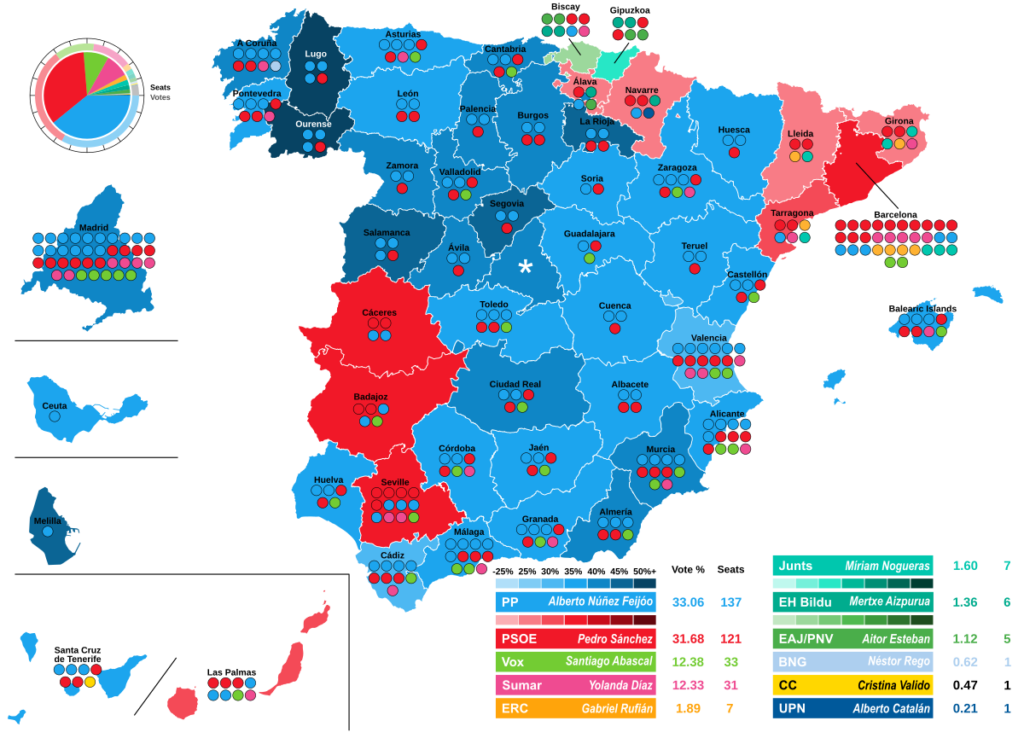In July 2023, Spain witnessed a critical political moment with the national elections, marking a dramatic departure from recent right-wing victories across Europe. Contrary to polling predictions, Spain’s conservative Partido Popular (PP) and far-right Vox failed to secure the absolute majority they were aiming for. This unexpected outcome was a result of last-minute mobilizations by left-wing voters determined to prevent far-right influence in national governance for the first time since Franco’s dictatorship. The result left Spain with a hung parliament, indicating a politically divided nation and posing significant challenges in the formation of a stable government.

A Victory for the Left, But Uncertain Future
The success of Spain’s Socialist Party (PSOE), led by Prime Minister Pedro Sánchez, surprised many. Facing a rising tide of conservatism, Sánchez called for snap elections in a bold move that ultimately paid off. PSOE, along with the leftist coalition Sumar, prevented a full takeover by the right-wing, preserving a path for progressive governance. Sánchez’s leadership gained support as voters expressed their concern over the growing collaboration between the PP and Vox at regional levels, where their governance threatened the rollback of key social policies. Despite this win, forming a new government remains highly complex. PSOE and Sumar secured 122 and 31 seats respectively, short of the 176 needed for a majority in Spain’s Congress of Deputies.
This leaves the left relying on nationalist and regionalist parties, including Catalan and Basque pro-independence groups, to secure a coalition. The decisive role of these smaller parties reflects the deep regional divisions within Spain and suggests that Sánchez will face a difficult path forward in securing stable governance without significant compromises.
Right-Wing Defeats and Vox’s Decline
For the right-wing, the elections marked a severe blow. The PP garnered 33% of the vote and 136 seats, the largest share, but this was far from enough to form a government. The far-right Vox, led by Santiago Abascal, saw a sharp decline in support, losing around 600,000 votes and dropping from 52 to 33 seats. Vox’s ultra-nationalist rhetoric and radical positions—ranging from climate denial to opposing gender equality—did not resonate as strongly as anticipated. This electoral retreat has been a setback for the party, dampening concerns about a broader rise in European fascism.
The alliance between PP and Vox, intended to create a conservative bloc in Madrid, failed to materialize at the national level. This reflects the limitations of far-right politics in Spain, where issues like regional autonomy in Catalonia and the Basque Country remain too contentious for Vox’s centralizing and anti-independence stance. With a diverse electorate and strong regional identities, Spain’s political landscape has proved resistant to the consolidation of far-right power seen in other European nations like Italy or Hungary.

Regional Divides and Nationalist Influence
The election underscored the importance of Spain’s regional parties, particularly in Catalonia and the Basque Country. The role of the pro-independence party Junts per Catalunya, led by exiled former president Carles Puigdemont, has become critical in shaping the future government. With seven key seats, Junts could enable the formation of a minority left-wing government if they abstain from voting in the investiture session. However, Puigdemont’s demands for amnesty for pro-independence activists and a referendum on Catalan independence remain sticking points.
Catalonia and the Basque Country have long been strongholds of progressive politics, and their votes proved decisive in preventing a right-wing victory. In Catalonia, PSOE secured more than 1.2 million votes, outperforming pro-independence parties, which have seen declining support since the failed 2017 independence bid. Similarly, in the Basque Country, the left-wing Basque party EH Bildu overtook the traditionally dominant PNV, reflecting shifting dynamics in regional politics.
The Challenges Ahead
Although Sánchez and his coalition partners managed to fend off the right, the road ahead is far from easy. Spain’s fragmented parliament means that every piece of legislation will require careful negotiation, and the looming possibility of another election remains. The right-wing bloc, emboldened by its regional wins and backed by a powerful media apparatus, will undoubtedly continue to challenge Sánchez’s government at every turn.
Spain’s economic challenges, exacerbated by inflation, housing shortages, and youth unemployment, will also test the resilience of the new government. Voters, particularly younger generations, are becoming increasingly disillusioned with politics, and the Sánchez administration will need to deliver meaningful reforms to retain their support.
A Fragile Left-Wing Victory
Spain’s 2023 elections mark a crucial moment in the country’s political evolution. While the left’s success has staved off a far-right resurgence, the future remains uncertain. The challenges of coalition building, regional divisions, and economic instability will shape the coming years. Yet, this victory for the left shows that right-wing dominance in Europe is not inevitable. For now, Spain remains a battleground for the forces of progress and reaction, with the potential to set an example for the rest of Europe on how to resist the rising tide of nationalism and authoritarianism.


